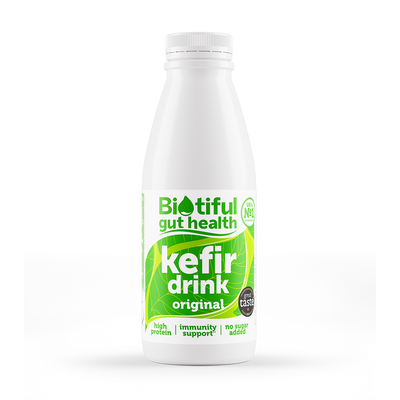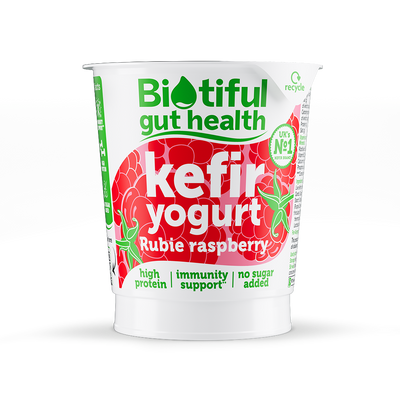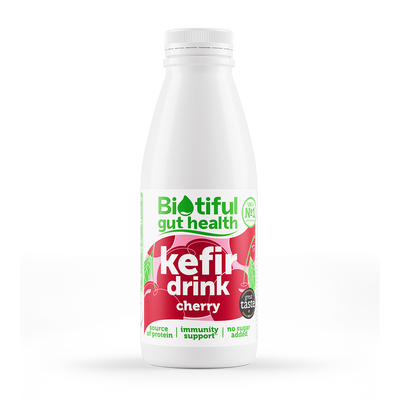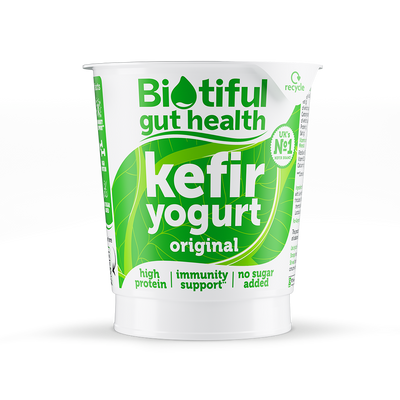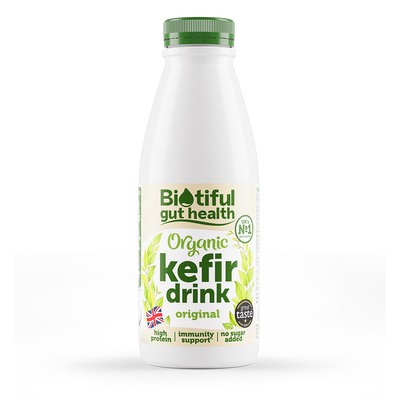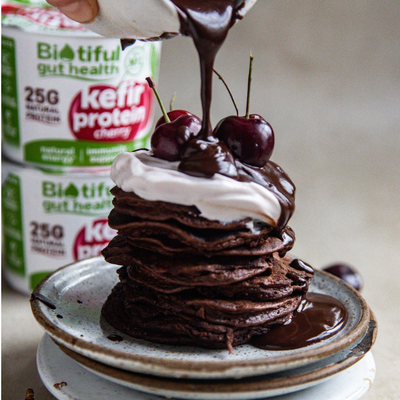
How does Kefir help to improve mental health and gut health?
Kefir and mental health are also linked, as consuming fermented products like Kefir supports gut health, which is linked to improved mental well-being. Our Biotiful Kefir yogurts and drinks are packed with billions of live cultures to help create diversity within your gut-brain connection. We believe a happy gut is the foundation of a happy mind.
A balanced microbiome helps your body produce feel-good hormones like serotonin, manage stress more effectively, and elevate your overall sense of well-being. A brighter mood starts with a healthier gut thanks to the gut-brain axis, which you can achieve with Biotiful Kefir.

CLICK TO VISIT OUR SUPERMARKETS
Shop our bestselling Kefir!
What is the ideal gut health diet to improve mood?
By thoughtfully selecting these nutritious foods, you can naturally support your gut health and enhance your overall mental health.

FAQs about mood and gut health
Get the answers to some of the most frequently asked questions about mood and gut health!
What is the gut-brain axis?
Growing evidence suggests a strong link between gut health and mental health, as a result of the gut-brain axis. Conditions like anxiety often coincide with gut issues like IBS, and gut bacteria may influence anxiety and depression symptoms.
In your gut, serotonin contributes to various functions, including digestion. The serotonin changes in your gut may also send signals to your brain, influencing neurotransmitter production. In the brain, serotonin plays a key role in regulating mood and sleep, which is why the gut mind connection is so strong. Additionally, gut bacteria produce GABA, a neurotransmitter that helps alleviate stress, anxiety, and fear. Animal studies suggest that enhancing “good” gut bacteria with probiotics can boost GABA production.
Therefore, maintaining gut health through a balanced diet rich in fibre, natural protein sources and fermented foods like Kefir, regular exercise, and stress management is crucial for supporting mental health and wellbeing. At Biotiful, we’re committed to helping you support your mental health through our Kefir, which is naturally rich in beneficial bacteria.
Are there studies that support the link between gut health and mental health?
Researchers have identified specific gut microbes associated with mental health. One study found that people with depression had lower levels of Dialister and Coprococcus bacteria, which correlated with lower quality-of-life scores. Fecal microbiota transplants (FMT) are being explored as a potential treatment. Transferring gut bacteria from healthy donors has temporarily improved depression and anxiety symptoms in some studies, though effects often fade over time.
Another fascinating study on the gut mind connection conducted by John Cryan at the University of Cork found that in a germ-free environment, where there are no microbes, the brain does not develop normally. We need our microbes for our gut health and mental health. They can even produce neurotransmitters like GABA (to help calm us), serotonin (our feel-good hormone), and dopamine (for pleasure, satisfaction and motivation), which is why our gut and brain are so closely connected.
Thankfully, there’s so much we can do to support our gut-brain connection, improve mood, and reduce feelings of stress and anxiety. One of my favourite studies demonstrating this is called the Psychobiotic Diet. It is incredibly empowering, showing how much we can do to support gut health, mental health and good mood.
Why is the gut referred to as the second brain?
We often refer to the gut as our second brain because the gut and brain are derived from the same foetal tissue, which is why there is such a strong connection. One part becomes the central nervous system, and the other part becomes the enteric nervous system—the gut. The enteric nervous system is the network of nerves that spans your entire digestive tract, from your mouth all the way to your anus. As the foetus develops, this tissue separates but remains connected by our 10th cranial nerve, called the vagus nerve. Our mood and gut health are so heavily intertwined for this very reason, so look after your gut health, and you’re also caring for your mental health, mind and mood.
How can I improve my mental health to support my gut health?
Just as much as your diet can impact your brain, your mental health can impact your gut health. If you’re stressed, anxious or don’t get enough sleep, then it can disrupt the balance of bacteria in your gut, which then has a knock on effect on your overall health and wellbeing.
So, looking after yourself mentally is just as important as fuelling your gut physically, to maintain a healthy gut and brain connection. Stress-reducing activities like walking, running, dancing, going to the gym or yoga can all help to improve your mental wellbeing, along with making time for relaxing activities you enjoy, whether it be painting, spending time outside, catching up with friends and family or cooking.
Getting enough sleep is also essential for your mental health, as improved sleep quality helps to regulate your sleep-wake cycle, so aiming for 7-8 hours of sleep per night, and prioritising winding down for an hour before bed rather than watching TV or using your phone, is really important for the gut and brain connection. Sleep can also significantly impact gut health, as if you aren’t getting enough sleep, it can cause disruption to hormone regulation, shift the composition of the gut microbiome and it can lower melatonin which is needed for gastrointestinal motility.
When your brain is healthy and your mental health is better, your gut health will thank you for it!















